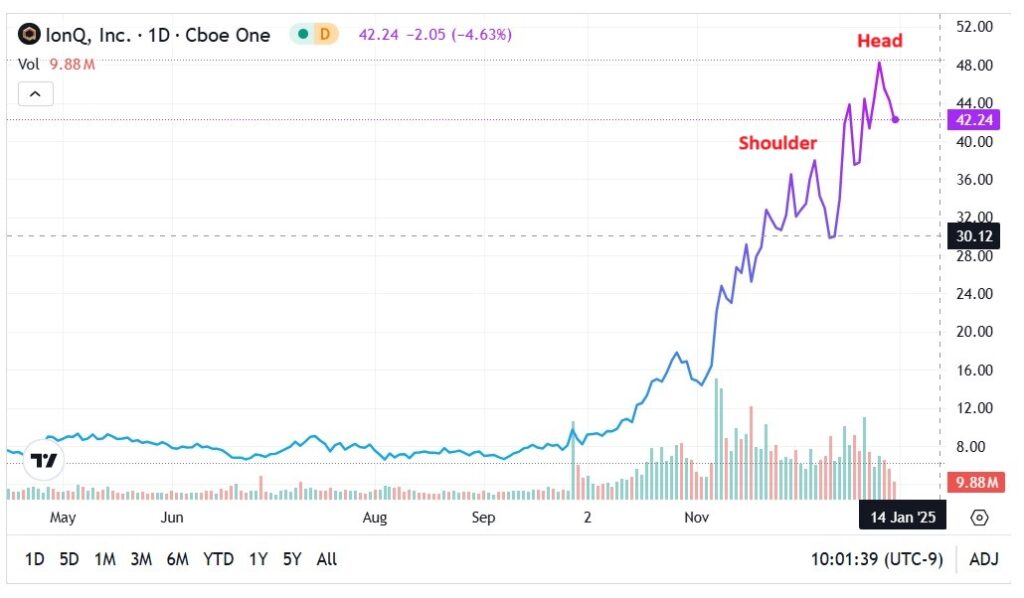Zinger Key Points
- Although a surge in demand for quantum computing sent shares of IonQ soaring, the narrative appears stretched.
- Generally speaking, IonQ stock carries a negative bias, incentivizing a bearish outlook.
- Feel unsure about the market’s next move? Copy trade alerts from Matt Maley—a Wall Street veteran who consistently finds profits in volatile markets. Claim your 7-day free trial now.
Thanks to Alphabet Inc's GOOGGOOGL Google Quantum AI announcing its latest quantum chip Willow, sentiment for sector-related securities — which was already blossoming — stepped up several notches. At the same time, investors have legitimate concerns about individual names like IonQ IONQ moving too far, too fast.
Fundamentally, quantum computers and their ability to process complex calculations swiftly offers incredible implications for artificial intelligence. However, the business side also matters, potentially drawing skepticism. For example, IonQ's revenue growth on a sequential basis has noticeably slowed. In addition, the company currently posts losses.
The other factor that investors turning into the quantum computing narrative should assess is sentiment among institutional investors. Last Thursday, the largest transaction in the options market by far was for sold calls; specifically, $810,000 worth of $65 short calls expiring April 17, 2025. Earlier this morning, the derivatives market lit up again, with purchased $30 put options expiring on the aforementioned date garnering the spotlight.
With the smart money betting for the downside outcome, retail investors should at least consider following suit.
See Also: Is SPY Losing Its Spark? The S&P 500’s Risk Conundrum
Historical Trends Don't Bode Well For IonQ Stock
From a bullish point of view, one of the main concerns about betting long on IonQ stock is that it features a negative bias. Going back to its market debut in January 2021, there have been 208 weeks. Out of this figure, only 93 weeks saw a positive return from Monday's opening price to Friday's close. Accounting for four weeks of flat returns, this leaves only a 44.71% success ratio for the bulls on any given week.
Interestingly, during periods of extreme sentiment cycles where the price action runs multiple standard deviations beyond the mean, the aforementioned negative bias remains intact. For example, there have been 40 weeks (not including December 2024) where IonQ stock returned 10% or greater. Within this tally, IonQ recorded 17 instances where it posted a non-zero positive return by the end of the fourth subsequent week or a success ratio of 42.5%.
What's more, there have been 14 weeks where IonQ stock returned 20% or greater. By the end of the fourth subsequent week, there had been six instances where IonQ posted a positive return or 42.86%. The bottom line? Initial strength in IONQ stock tends to beget more strength, perhaps a byproduct of the fear of missing out (FOMO). But consistently, shares eventually lose steam.

Another reason to be cautious about IonQ stock is its technical pattern. Currently, IonQ appears to be printing a bearish head-and-shoulders formation. If so, the pattern may suggest near-term downside risk.
Extracting Profits with a Bear Put Spread
Notably, for the business week ending Dec. 20, IonQ stock delivered a 36.8% return. As discussed earlier, the security tends to have a negative bias as early buying activity fades. Further, on the negative instances when IonQ falls four weeks after posting a weekly return of 20% or greater, the average loss comes out to 14.6%.
Therefore, a baseline target is to assume the possibility of shares falling to $37.95 (14.6% below the Dec. 20 closing price of $44.42) by the Jan. 17, 2025 expiration date. An aggressive approach is to consider the 40/38 bear put spread. This strategy involves buying the $40 put and simultaneously selling the $38 put. The credit received from the short put partially offsets the debit paid for the long put.
However, in order to collect the maximum payout of 102%, IonQ stock must fall to $38 or below by the close of Jan. 17. Again, that might be aggressive for some investors. A more conservative wager would be the 41.50/40 bear put spread. In this trade, IonQ only needs to fall to $40 by expiration to collect the maximum reward, which is a payout of 76.5%.
Now Read:
Image: Courtesy of IONQ
Edge Rankings
Price Trend
© 2025 Benzinga.com. Benzinga does not provide investment advice. All rights reserved.
Trade confidently with insights and alerts from analyst ratings, free reports and breaking news that affects the stocks you care about.